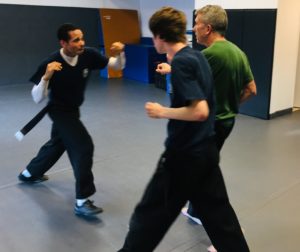 “It is better to avoid than to run, better to run than to de-escalate, better to de-escalate than to fight, better to fight than to die.” – Rory Miller.
“It is better to avoid than to run, better to run than to de-escalate, better to de-escalate than to fight, better to fight than to die.” – Rory Miller.
If it is possible for something to be “more” true, then Miller’s pithy statement is even more true when you find yourself alone, unarmed, and facing more than one opponent.
Avoid first: if you are informed, you will tend to never even be in a scenario where a group of people is trying to beat you senseless. Miller recommends avoiding places where young males consume alcohol because those are the locations where fights tend to break out. The best way to “win” a fight is to not to be there in the first place.
Run next: maybe you like going to places where young men drink alcohol. Awesome. Fun things happen in bars and at parties and the majority of the time no fights break out (although there are some places where fights are pretty much guaranteed on a nightly basis and if you like to go to those places, your choices are your business). Maybe a conflict breaks out in a normally calm space, or you are simply accosted. The “run” step means staying aware so that if you see a confrontation brewing, you leave. Do you know where the exits are? Are you watching the room? Are people getting rowdy or just having fun? Are you staying within the social norms of the groups around you or are you (purposefully or accidentally) upsetting people’s sense of what is acceptable behavior?
De-escalate before engaging: if the conflict falls in your lap, or you missed the cues, try and talk your way out of things. It is helpful to have some understanding of why people want to fight. Much of the time, people use aggression to enforce social dominance. Swallow your ego and apologize. Listen to the grievance and let it go. Certainly, there are arguments worth having, philosophy worth discussing, and ideals worth upholding. Is this grievance worth a fight? I have no place telling you which fights are worth blood and bruises and which should be walked away from but I do know that people’s mind’s are rarely changed by bashing their faces in. There is also a small percentage of every population who are predators – people who simply engage in violence to be violent. Reacting to and dealing with predators is a whole different mess that we won’t get into here (although it is an excellent subject to research).
Fight last: maybe you tried to run and/or de-escalate and it failed. Maybe you never got a chance because you were jumped. Whatever the case, now you can fight or die. A friend of mine told me a wonderful story in which he stood there and let an angry young man punch him in the gut. My friend pretended to double over in pain and roll on the floor and the angry young man walked away, satisfied enough with the results to call the fight over. Maybe my friend was lying and he really got punched hard in the breadbasket. Maybe taking the punch was a super clever form of de-escalating. Maybe you think my friend was weak for letting the young man gut punch him. There may be some opportunity to still de-escalate even when the punches start flying but, like all strategies in fighting, there is risk.
Strategies for fighting multiple opponents: so if all other options fail, or were never present to begin with, what is the most important strategy for surviving against multiple opponents? Constant forward pressure. Strategy wise, it is really no different than fighting one opponent. To win, you must present your opponent with multiple problems to solve so that they are mentally (and perhaps physically) on their heels and reacting to what you are doing rather than formulating their own plan.
Specific tactics against multiple opponents: lots of footwork, striking, and using physical barriers so that you are fighting one person at a time. Can you move into a position such that one person is blocking the other(s) from getting at you? Are there physical barriers like a table, door, tree, or car that you can manuever around such that the opponent(s) you aren’t currently engaged with are chasing you rather than attacking you? Can you mostly avoid clinching and grappling, as it anchors you to one spot and makes you an easier target? If you do end up in a clinch or grapple, do you have the skills to quickly disengage?
Conclusion: fighting is a mess. Training certainly matters and we have all seen how a highly trained fighter can easily handle an untrained amateur in a controlled sport situation. Many of us in the martial arts community have seen the youtube videos of highly trained fighters handling an amateur in a self defense scenario… and also seen the trained fighter fail against an amateur. Many of us have probably seen fist fights, pushing matches, and perhaps even genuine knock down drag out violence in person. More people means a bigger mess. Crazy things happen. Training matters but as the numbers stack (2 on 1, 3 on 1, 4 on 1), the odds get longer and longer. Avoid it by knowing where violence happens. Run when you see it coming. De-escalate when you’re caught in it. Fight when you have to. Always be training.
